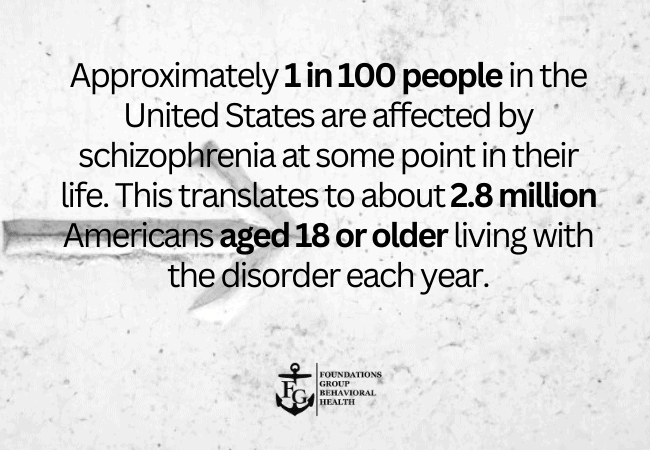At Foundations Group Behavioral Health, we recognize that mental health conditions like psychosis and schizophrenia can be challenging to understand, both for those affected and their families. While these terms are often used interchangeably, they are distinct conditions with different diagnostic criteria and treatment approaches. It’s crucial to differentiate between psychosis and schizophrenia to better manage symptoms and improve treatment outcomes. This blog aims to clarify these terms, explain their differences, and highlight the effective treatment options available, including those found in our Schizophrenia Treatment Program.
What is Psychosis?
Psychosis is a broad mental health term that describes a disconnection from reality. It involves symptoms that significantly distort a person’s thoughts, perceptions, and behaviors. The primary symptoms of psychosis include hallucinations, delusions, and disorganized thinking.
- Hallucinations: These occur when someone perceives things that aren’t there, such as hearing voices, seeing things, or feeling sensations that others do not.
- Delusions: These are false beliefs that remain firmly held despite evidence to the contrary. For example, someone may believe that they have special powers or that others are plotting against them.
- Disorganized thinking: This refers to difficulty organizing thoughts, which can lead to incoherent speech or a lack of logical flow in conversations.
Causes of Psychosis
Psychosis can occur as a symptom of various underlying conditions, including:
- Mental health disorders: Conditions like bipolar disorder, major depressive disorder, and schizophrenia often involve psychosis.
- Substance use: Certain drugs, such as cocaine, LSD, and methamphetamine, can induce psychosis. Withdrawal from alcohol or other substances may also lead to psychotic symptoms.
- Brain injury or medical conditions: Psychosis can also be linked to neurological disorders, brain tumors, or infections affecting the brain, such as encephalitis.
- Trauma: Experiencing severe stress, trauma, or significant life changes can also lead to psychosis, especially in vulnerable individuals.
Psychosis is treatable, and the treatment depends on the underlying cause. For instance, psychosis associated with anxiety or depression would require a different treatment approach compared to psychosis caused by substance use or medical conditions.
What is Schizophrenia?
Schizophrenia is a chronic and severe mental disorder that falls under the category of psychotic disorders. Unlike psychosis, which is a symptom, schizophrenia is a full-blown disorder that involves a combination of symptoms affecting thoughts, feelings, and behaviors over a long period.
Symptoms of Schizophrenia
The symptoms of schizophrenia can be divided into three major categories:
- Positive Symptoms: These symptoms are “extra” behaviors that aren’t typically present in healthy individuals and include hallucinations, delusions, and disorganized thinking or speech.
- Negative Symptoms: These involve a decrease or loss of normal functioning. This might include a lack of motivation, social withdrawal, a decrease in emotional expression, and reduced ability to perform daily activities.
- Cognitive Symptoms: Schizophrenia can impair cognitive functions like attention, memory, and executive functioning, making it hard to process information or make decisions.
Causes and Risk Factors of Schizophrenia
Schizophrenia is a complex condition, and its exact cause is not fully understood. However, it is believed to result from a combination of genetic, biological, and environmental factors:
- Genetics: A family history of schizophrenia increases the risk, though not everyone with a family history will develop the disorder.
- Brain chemistry and structure: Abnormalities in the brain’s neurotransmitter systems, especially dopamine and glutamate, are linked to schizophrenia.
- Environmental factors: Early life stress, traumatic events, drug use, and viral infections during pregnancy may contribute to the onset of schizophrenia in those genetically predisposed.
Schizophrenia often manifests during late adolescence or early adulthood and can last for a lifetime. People with schizophrenia require ongoing treatment to manage symptoms and improve quality of life.

Key Differences Between Psychosis and Schizophrenia
While the terms psychosis and schizophrenia are often used interchangeably, they refer to different mental health concepts. Understanding these differences is essential for effective diagnosis and treatment. Below, we highlight the primary distinctions between psychosis and schizophrenia in terms of symptoms, duration, causes, and treatment.
1. Definition and Nature of the Condition
- Psychosis is a symptom, not a standalone condition. It refers to a disconnection from reality, where an individual may experience hallucinations, delusions, or disorganized thinking. Psychosis can occur in various mental health disorders, including bipolar disorder, major depression, or schizophrenia. It can also be triggered by substance use, trauma, or medical conditions like brain injuries or infections.
- Schizophrenia, on the other hand, is a chronic mental health disorder that falls under the category of psychotic disorders. It is characterized by persistent and often severe psychotic symptoms such as hallucinations, delusions, and disorganized thinking. Schizophrenia also includes other symptoms such as negative symptoms (e.g., lack of motivation, social withdrawal) and cognitive symptoms (e.g., memory problems, difficulty with decision-making).
2. Duration and Onset
- Psychosis is typically temporary and may resolve with treatment of the underlying cause, such as medication or therapy addressing the mental health issue, substance use, or medical condition. In some cases, psychosis can be a one-time event or episodic.
- Schizophrenia is a long-term condition, often emerging in late adolescence or early adulthood, and requires ongoing management. The symptoms of schizophrenia can last for months or years, with periods of remission and relapse. Treatment for schizophrenia is typically lifelong and focuses on symptom management.
3. Symptoms
- Psychosis involves specific symptoms that distort an individual’s perception of reality, including:
- Hallucinations: Perceptions of things that aren’t real (e.g., hearing voices, seeing things that others do not).
- Delusions: False beliefs that are not based in reality (e.g., believing someone is controlling their thoughts or that they have special powers).
- Disorganized thinking: Difficulty organizing thoughts, often leading to incoherent speech or thoughts that don’t follow a logical sequence.
- Schizophrenia shares many of these symptoms but also includes other categories of symptoms:
- Positive Symptoms: These are symptoms added to a person’s behavior, such as hallucinations, delusions, and disorganized speech.
- Negative Symptoms: These refer to a decrease or loss of normal functioning, such as reduced ability to experience pleasure, lack of motivation, or social withdrawal.
- Cognitive Symptoms: These affect memory and thinking abilities, making it difficult for individuals to focus, plan, or remember tasks.
4. Causes
- Psychosis can be triggered by a variety of factors, including:
- Mental health conditions like bipolar disorder, severe depression, and schizophrenia.
- Substance use (e.g., drugs like cocaine, methamphetamine, or LSD).
- Medical conditions like brain infections, injuries, or tumors.
- Trauma or severe stress.
- Schizophrenia has a more complex set of causes, often involving a combination of genetic, biological, and environmental factors:
- Genetic predisposition: A family history of schizophrenia increases the likelihood of developing the disorder, although not everyone with a family history will develop it.
- Brain chemistry and structure: Abnormalities in the brain’s neurotransmitter systems, particularly dopamine and glutamate, are linked to schizophrenia.
- Environmental triggers: Stressful life events, childhood trauma, and substance abuse can increase the risk in individuals who are genetically predisposed.
5. Treatment Approaches
- Psychosis treatment depends on the underlying cause. If psychosis is a symptom of a mental health disorder (like anxiety or depression), treating the primary condition will often reduce or resolve psychotic symptoms. Treatment might include:
- Antipsychotic medications to manage hallucinations or delusions.
- Psychotherapy such as cognitive-behavioral therapy (CBT) or supportive therapy to help individuals cope with disorganized thinking and emotions.
- Schizophrenia requires a comprehensive, ongoing treatment plan. The focus is on managing symptoms over the long term, which typically includes:
- Antipsychotic medications to control the positive symptoms (e.g., hallucinations, delusions).
- Psychotherapy: Cognitive-behavioral therapy (CBT), family therapy, and other therapeutic approaches to help manage symptoms, improve social skills, and increase adherence to treatment.
- Social and occupational skills training to help individuals re-enter the workforce and social environments.
How is Schizophrenia Treated?
Schizophrenia requires a comprehensive treatment approach to manage symptoms, reduce the frequency and severity of psychotic episodes, and improve overall functioning. Treatment typically includes a combination of medication, therapy, and lifestyle interventions.
At Foundations Group Behavioral Health, we offer a Schizophrenia Treatment Program that provides integrated care tailored to each individual’s needs. Our treatment plan aims to help individuals manage their symptoms, build coping strategies, and work toward long-term recovery.
Key Treatment Components:
- Antipsychotic Medications: These are the primary treatment for schizophrenia. They help manage the positive symptoms, such as delusions and hallucinations. Antipsychotics work by adjusting brain chemistry, particularly dopamine and serotonin levels.
- Psychotherapy: Cognitive-behavioral therapy (CBT) and other forms of therapy help individuals challenge distorted thinking, manage stress, and develop coping mechanisms for dealing with the disorder.
- Supportive Services: In addition to individual therapy, family therapy, and support groups play a crucial role in managing schizophrenia. These services help families understand the condition and provide essential emotional support to individuals affected by schizophrenia.
- Social and Occupational Skills Training: Training in social skills and job readiness can help individuals with schizophrenia reintegrate into society and regain independence.
- Hospitalization: During acute psychotic episodes, hospitalization may be necessary to stabilize symptoms and ensure safety.
Our Psychiatric Day Treatment and Half Day Treatment Programs are ideal for individuals who need structured support during the day but are stable enough to return home at night. These programs integrate therapy, medication management, and skill-building exercises to foster progress in recovery.
Co-Occurring Disorders and Comprehensive Care
Many individuals with schizophrenia experience additional mental health conditions, such as anxiety, depression, or trauma disorders. The presence of co-occurring disorders can complicate diagnosis and treatment but also emphasizes the importance of a holistic approach to care.
At Foundations Group Behavioral Health, we specialize in Co-Occurring Disorder Treatment Programs, which are designed to treat schizophrenia alongside any additional conditions, ensuring that individuals receive comprehensive care. Through integrated therapy and support, we help clients manage both schizophrenia and any co-existing disorders for a more balanced and effective recovery process.
Conclusion
Understanding the difference between psychosis and schizophrenia is essential for accurate diagnosis and effective treatment. While psychosis is a symptom that can be caused by various factors, schizophrenia is a chronic condition that involves recurring episodes of psychosis. At Foundations Group Behavioral Health, we provide a Schizophrenia Treatment Program that integrates medication, therapy, and support services to help individuals with schizophrenia manage their symptoms and live fulfilling lives. Whether you or a loved one is dealing with schizophrenia or experiencing psychosis, professional treatment is crucial to finding the right support and care. Contact us today at 508.388.5324 to book your first session and begin your journey toward a more mindful future.
FAQ on Difference Between Psychosis and Schizophrenia
What is the difference between psychosis and schizophrenia?
Psychosis is a symptom characterized by a disconnection from reality, which can be caused by various mental health disorders, medical conditions, or substance use. Schizophrenia, however, is a chronic mental health disorder that includes persistent psychotic symptoms, along with other cognitive and negative symptoms. While psychosis can occur in schizophrenia, it is not exclusive to it.
Can psychosis be treated?
Yes, psychosis can often be treated effectively, especially when the underlying cause is identified. Treatment may include antipsychotic medications, therapy, and support to manage symptoms, depending on whether psychosis is caused by a mental health condition, substance use, or other factors.
Is schizophrenia treatable?
Schizophrenia is a chronic condition that requires lifelong management. With the right treatment, including antipsychotic medications, therapy, and skills training, individuals with schizophrenia can lead fulfilling lives and manage their symptoms.
What are the main symptoms of schizophrenia?
The main symptoms of schizophrenia include hallucinations, delusions, disorganized thinking, negative symptoms (e.g., lack of motivation), and cognitive symptoms (e.g., difficulty concentrating or remembering). These symptoms can significantly affect daily life.
How is schizophrenia treated?
Schizophrenia treatment typically involves antipsychotic medications to address psychotic symptoms, along with psychotherapy, skills training, and family support. Comprehensive care that includes medication management, therapy, and social skills development is essential for effective treatment.








